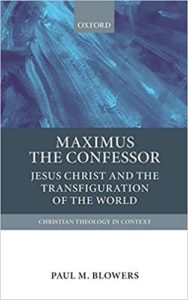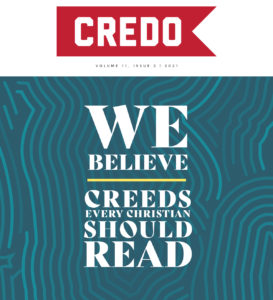Spend enough time on evangelical Twitter (always at your own risk) and you’re bound to find a historical theologian singing the praises of a particular church father. And I don’t mean Saint Augustine. No, there’s another lesser-known though no less important church father who evangelical seminary professors and presidents (looking at you Fred Sanders and Scott Swain) fangirl over: Maximus the Confessor. At least the numerous quotes tweeted out over the years from the likes of these is how I was first introduced to the Confessor. But maybe that’s just me. 
In Maximus the Confessor: Jesus Christ and the Transfiguration of the World (Oxford University Press, 2016), Paul Blowers has given the Confessor’s thought a thorough, book-length treatment, by the end of which one understands just what all these evangelical theologians are (rightfully) going on about. Blowers is one of the foremost scholars of Maximus having translated On the Cosmic Mystery of Jesus Christ for Saint Vladimir’s Press’ “Popular Patristic Series” with Robert Louis Wilson along with authoring numerous articles and being a regular presenter at international conferences on Maximus. He’s one of the few scholars in the world who could have taken up such a task and been successful at it.
And successful he is. Maximus the Confessor is a Master Class in retrieval and engagement with patristic sources and this is one of the greatest benefits of the book. It’s hard to imagine someone skeptical of patristic sources reading the book and not coming away seeing the importance of such work. Blowers’ knowledge of Maximus and his ability to wade through the incredible amount of scholarship that he does is stunning. At one and the same time, Maximus the Confessor is both a treatment of Maximus’s entire theological schema (including two chapters covering the background preceding Maximus and a biographical sketch of the Confessor) and an interaction with and distillation of the field of Maximus studies. It’s truly a feat and Blowers deserves to be commended for it. Transfiguring the Cosmos Share on X
While Blowers’ work is of the highest academic quality, the import of Maximus’s theology is not hard to trace for the reader. Though this is not a primary aim of Blowers’, for those attuned to contemporary theological quibbles within evangelicalism, it is immediately clear while reading the book just how applicable Maximus’s thought is today.
As can be surmised from the subtitle of the book, Maximus’s theological vision is global in scope. At least as far as Blowers sees it, this is the centerpiece of Maximus’s entire theology. Maximus is concerned with the mystery of the “transfiguration of the world” in Jesus Christ. And yet putting it that way, when taken overly literally, actually too narrowly limits the scope of the gospel for Maximus. For in Maximus’s theological scheme, the gospel is cosmic in nature, not simply global, where all in the universe is redeemed and transformed (134). “The Christian Gospel gave witness to a universe being transfigured, to an emerging cosmic and eschatological politeia embracing all of spiritual and material creation, of which Jesus Christ was both the pioneer and the perfecter in his incarnation” (101). The gospel reaches to every corner of creation and integrates it into the grand drama of God’s redemption in Christ. For Maximus, this in no way necessitates a loss of sight of the individual nature of redemption. Individual humans are indeed redeemed and transformed. In fact, Blowers notes that humans are the “prime beneficiaries” (156) of Christ’s redemptive work. It’s just that humans are not the only beneficiaries. Maximus’s rendering of the gospel reaches to every nook and cranny of the cosmos. Maximus’s rendering of the gospel reaches to every nook and cranny of the cosmos. Share on X
As Twitter threads resound with arguments over the extent of the gospel–whether or not this or that is only an implication or an integral part of the gospel itself–one can’t help but wonder if in Maximus there might be found a much needed guide for our times. Might Maximus reveal that a false choice is before us when we wonder about implications and integral aspects of the gospel? That, at least, is what I left wondering. I closed the final page of Maximus the Confessor with the overall impression that Maximus’s theology is ever-shouting, “Your gospel is too small!” If Maximus has one thing to teach us, it’s that the entire cosmos is caught up in the grand redemptive drama of Christ, all of it; there simply are no small potatoes.
Blowers ventures to the furthest heights and depths of Maximus’s theology which are far behind the scope of this review. Suffice it to say that it is a magnificent and awe inspiring ride. The contours of Maximus’s Christology (chapter 4) are some of the highest peaks of theological writing I’ve ventured on. His accounts of creation (chapter 3) and the church (chapter 5) and their role in the divine drama of redemption are unlike anything I’ve come across before. And these are only a few areas of Maximus’s theology Blowers takes up. Simply put, Maximus’s thought and Blowers distillation of it is nothing short of a gift.
As someone deeply interested in the study and reality of Global Christianity, a final, though relatively minor aspect of Maximus the Confessor is worth drawing attention to. I was deeply struck by the concluding paragraph of Blowers’ “Epilogue.” Blowers here is worth quoting at length:
Especially in its christological content, [Maximus’s cosmic gospel] is his legacy today for churches East and West still struggling to recover the unity of the Church grounded in the mystery that is Jesus Christ. Especially in its setting the lordship of Jesus Christ above all earthly powers-that-be, it is Maximus’s legacy for today’s postcolonial churches of the “Global South” (or of post-Soviet Georgia, the land of his burial) striving to fathom and interpret the mystery of Christ in their own new contexts. And whatever the differences of circumstances, Maximus’s sheer endurance as a Christian witness is encouragement to the battered and berated Christians in the land quite possibly of his own nativity, Christians now striving to keep their faith amid their own kinds of exile in “occupied territories” or in the larger war zones of the Middle East (334).
The sad state of affairs is that, outside academia, worthwhile connections between patristic studies and Global Christianity are rarely, if ever, made. This is seemingly due to an assumed lack of import of the patristics for the Church of the Majority World/Global South. Blowers has not bought the lie. He understands that the church’s history is all of the church’s history, even its “newest” members. However, the question should still be asked as to how Maximus’s theology and biography might be made more available and accessible to the vast majority of Christians not disposed to take up a volume in the Oxford Christian Theology in Context series or even have the resources to do so if they wanted to. If, as Blowers says, Maximus is the father par excellence for the Majority World church due to the reasons listed in his quote above, how do we get him to the Majority World church who lack the means to access him?
That question is at the feet of all Christians blessed with access to patristic resources: how do we get such rich resources from our shared history to our brothers and sisters around the globe who, generally speaking, lack such access for a variety of reasons? Do we really believe patristic resources are of vital importance for the Majority World Church? If so, how do we address the general obstacles between the two? One can hope this gap may soon be filled so that the Confessor’s rich and stirring thought (and that of other church fathers) might reach every corner of the globe as he believed the Lord Jesus’ gospel does.


